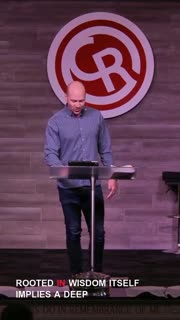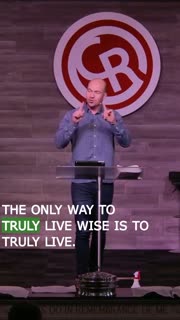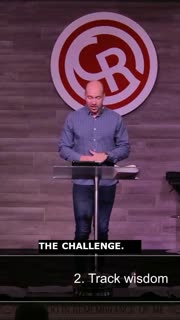Living Wisely: Embracing Purpose Beyond the Temporary
Devotional
Sermon Summary
Bible Study Guide
Sermon Clips
### Quotes for Outreach
1. "God created you for so much more. He really cares how you live your life. The truth is, he wants you to live wise. But you'll never live wise. Hear me, if you don't hear anything else, hear this. You'll never live wise if you don't know your why. You'll never live wise if you don't know your why." [37:26] (16 seconds)
2. "Rooted in wisdom itself implies a deep groundedness in the things of God, which is wisdom. Again, rooted in wisdom is a deep groundedness in the things of God. I wanted to be said for the record that wisdom is very, very valuable. The Bible says, seek wisdom, obtain it, do whatever you can." [38:54] (27 seconds)
3. "If you want to live wise, work hard. You may want to listen to this. I'm going to underline the word labor there. Author here in Ecclesiastics, he makes a salient point about work. You can work hard. You can toil your days. Then for what? What you worked hard for will no longer be yours. And your descendants may or may not appreciate it because they didn't have to work for it." [47:16] (23 seconds)
4. "Don't mishear me. You should work hard. But don't put your hope in work alone. Keep it in proper perspective. Work is good and is of God. But you can't stake your life on it. It alone will not allow you to live wise and satisfy your why in life." [49:55] (21 seconds)
5. "The only way to truly live wise is to truly live. For God. And so the question that I want to leave you with in a challenge, if I will, I want to give you this so you can put wise living into practice like this week, right? Not theoretically, but practically put it into being the question. First, I want to ask is, are you truly living for God?" [01:02:08] (21 seconds)
### Quotes for Members
1. "I wish there was a book that could help us avoid the pitfalls of life. To avoid the hardship and pain which comes from living in vain. Well, there is. And the wisdom in Ecclesiastes has pointed answers for all of life. And when I say pointed, oh boy, do I mean pointed. It's been said that, Ecclesiastes pricks our hearts to examine what really matters." [41:49] (26 seconds)
2. "If you want to live wise, number two, if you want to live wise, play harder. This passage is chock full. Full of sayings. And again, it doesn't quite translate in the same way it would have to a Jewish audience. But there are, in and through this passage, riddled with sayings that you would instantly pick up in context." [52:11] (24 seconds)
3. "If you want to be wise, if you want to live wise, die well. Number 3, if you want to live wise, die well. It seems odd, maybe even somber, but the writer of Ecclesiastes is pointing out the reality of the fact that one day you will die. Ultimately, though, to die well physically, you first have to die well spiritually." [57:04] (26 seconds)
4. "The pointy wisdom of Ecclesiastes is made to do nothing else than to cause you to realize that we need to not only be saved by his grace, but we need to be daily, daily molded by the gospel. We need to be living in pursuit of who God is and to not pursue these lesser things or even pretend that they're on the same plane. But let our hope be in Jesus." [01:00:25] (28 seconds)
5. "I want to issue the challenge. Make a commitment this week to seek wisdom for one hour. And see what happens. Journal a few mornings. Maybe memorize some scripture or just sit in silence. But when you do that, you will be amazed at how that has a cumulative effect on your life. And you just start with one. But before long, you know, you'll find yourself leaning into the presence of God and taking from his wisdom." [01:05:23] (29 seconds)
Ask a question about this sermon
1. "God created you for so much more. He really cares how you live your life. The truth is, he wants you to live wise. But you'll never live wise. Hear me, if you don't hear anything else, hear this. You'll never live wise if you don't know your why. You'll never live wise if you don't know your why." [37:26] (16 seconds)
2. "Rooted in wisdom itself implies a deep groundedness in the things of God, which is wisdom. Again, rooted in wisdom is a deep groundedness in the things of God. I wanted to be said for the record that wisdom is very, very valuable. The Bible says, seek wisdom, obtain it, do whatever you can." [38:54] (27 seconds)
3. "If you want to live wise, work hard. You may want to listen to this. I'm going to underline the word labor there. Author here in Ecclesiastics, he makes a salient point about work. You can work hard. You can toil your days. Then for what? What you worked hard for will no longer be yours. And your descendants may or may not appreciate it because they didn't have to work for it." [47:16] (23 seconds)
4. "Don't mishear me. You should work hard. But don't put your hope in work alone. Keep it in proper perspective. Work is good and is of God. But you can't stake your life on it. It alone will not allow you to live wise and satisfy your why in life." [49:55] (21 seconds)
5. "The only way to truly live wise is to truly live. For God. And so the question that I want to leave you with in a challenge, if I will, I want to give you this so you can put wise living into practice like this week, right? Not theoretically, but practically put it into being the question. First, I want to ask is, are you truly living for God?" [01:02:08] (21 seconds)
### Quotes for Members
1. "I wish there was a book that could help us avoid the pitfalls of life. To avoid the hardship and pain which comes from living in vain. Well, there is. And the wisdom in Ecclesiastes has pointed answers for all of life. And when I say pointed, oh boy, do I mean pointed. It's been said that, Ecclesiastes pricks our hearts to examine what really matters." [41:49] (26 seconds)
2. "If you want to live wise, number two, if you want to live wise, play harder. This passage is chock full. Full of sayings. And again, it doesn't quite translate in the same way it would have to a Jewish audience. But there are, in and through this passage, riddled with sayings that you would instantly pick up in context." [52:11] (24 seconds)
3. "If you want to be wise, if you want to live wise, die well. Number 3, if you want to live wise, die well. It seems odd, maybe even somber, but the writer of Ecclesiastes is pointing out the reality of the fact that one day you will die. Ultimately, though, to die well physically, you first have to die well spiritually." [57:04] (26 seconds)
4. "The pointy wisdom of Ecclesiastes is made to do nothing else than to cause you to realize that we need to not only be saved by his grace, but we need to be daily, daily molded by the gospel. We need to be living in pursuit of who God is and to not pursue these lesser things or even pretend that they're on the same plane. But let our hope be in Jesus." [01:00:25] (28 seconds)
5. "I want to issue the challenge. Make a commitment this week to seek wisdom for one hour. And see what happens. Journal a few mornings. Maybe memorize some scripture or just sit in silence. But when you do that, you will be amazed at how that has a cumulative effect on your life. And you just start with one. But before long, you know, you'll find yourself leaning into the presence of God and taking from his wisdom." [01:05:23] (29 seconds)










